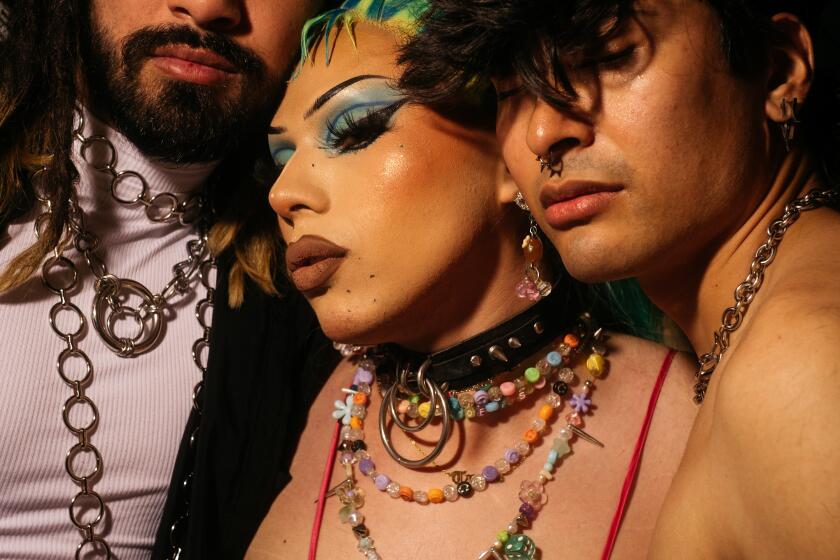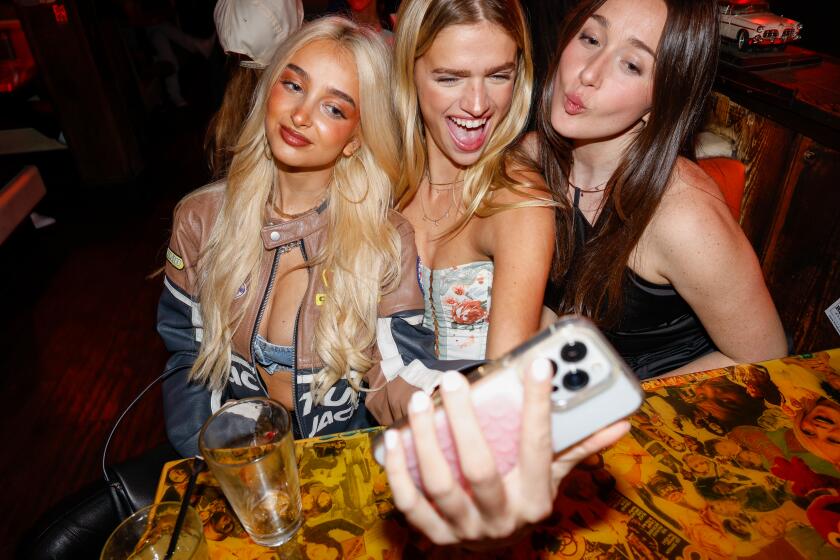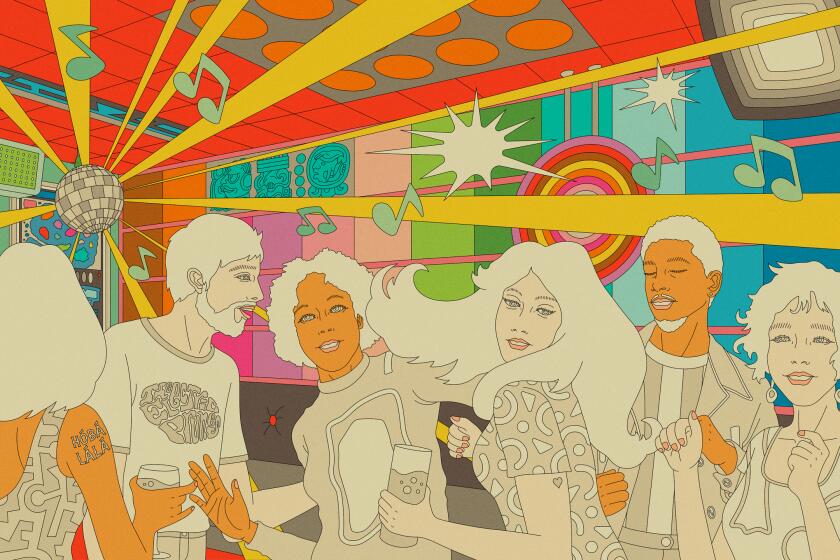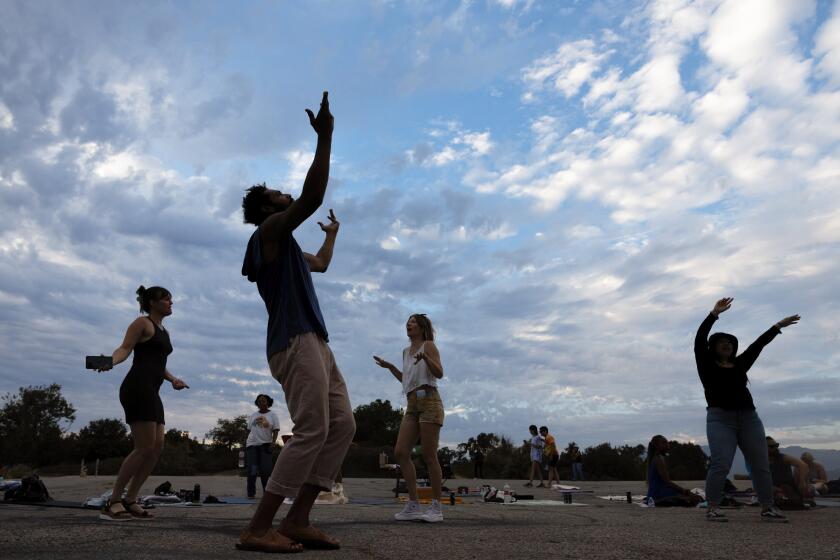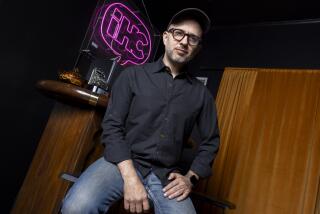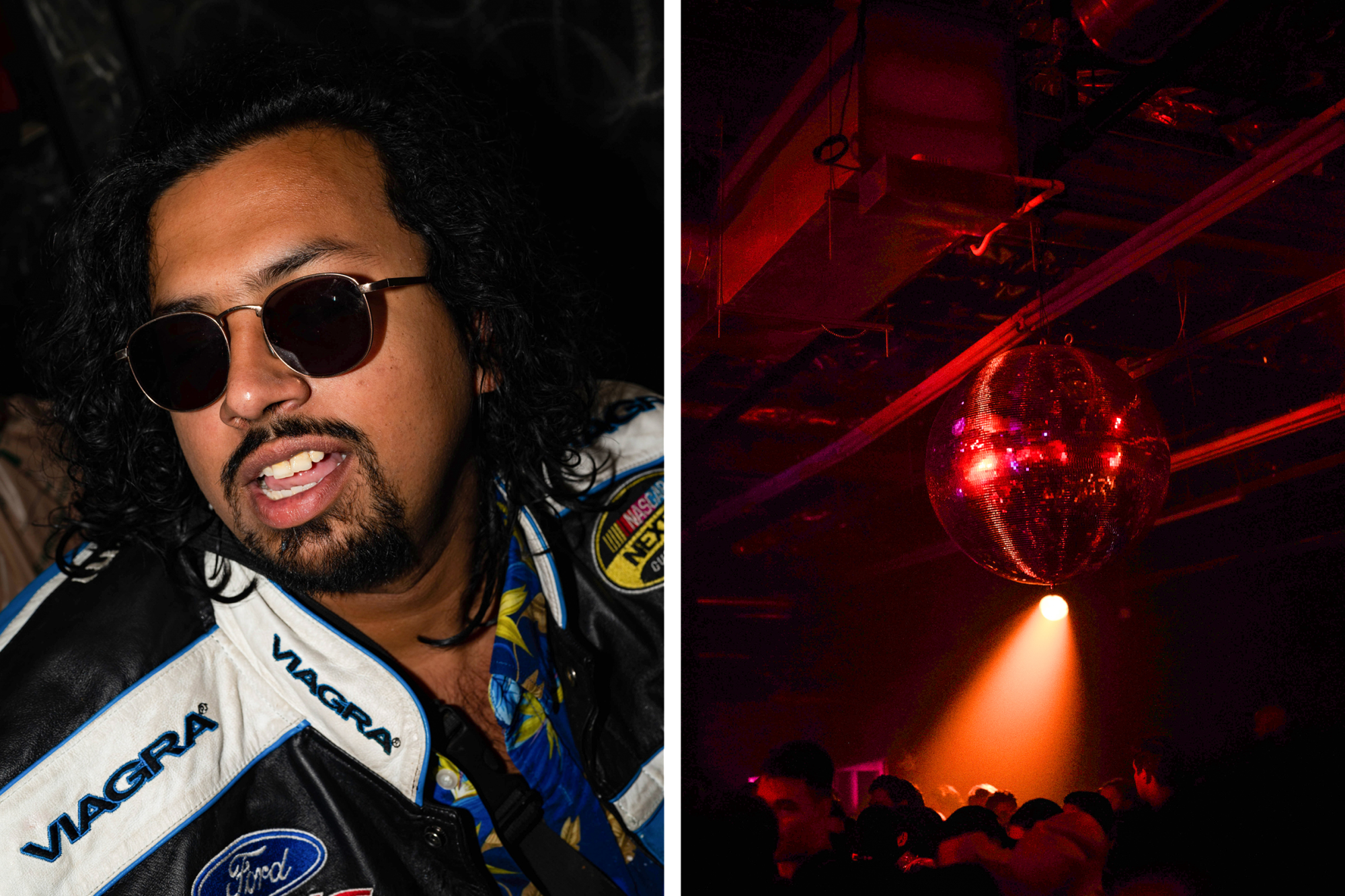
- Share via
Saptarshi Majumdar likes to say he always has the best seat in the house. Sometimes it’s next to the DJ booth at Koreatown’s Kiss Kiss Bang Bang nightclub, while a music video is being shot. Other times it’s at the Hollywood Palladium, for three sold-out Four Tet performances in a row. Almost every weekend, it’s on the crowded dance floors of underground warehouse parties in industrial parts of downtown and East Los Angeles. He’s usually smiling, long hair in his face, wearing sunglasses indoors, shirt possibly unbuttoned. But for Majumdar, who uses a wheelchair, securing his seat at nightlife outings across the city also comes with obstacles.
Majumdar, 26, goes by Sap. When we meet outside his Koreatown apartment on a fall evening, he whizzes down the parking lot ramp and brakes right next to me. A hospital band pokes out amidst the colorful wristbands from music events over the past three weeks. It’s from his recent stint due to complications with an infection caused by a cut, something that happens to him frequently because he can’t feel his feet. Born with spina bifida, a spinal development defect that can worsen over time, he began using a wheelchair when he was 13. Tonight, he is heading to a surprise ninth show by musician Fred Again.., who is in residency at the Shrine Expo Hall (he’d been to four of the eight announced performances that week), then to a warehouse party to see French DJ trio Apollonia play into the wee hours of the night.
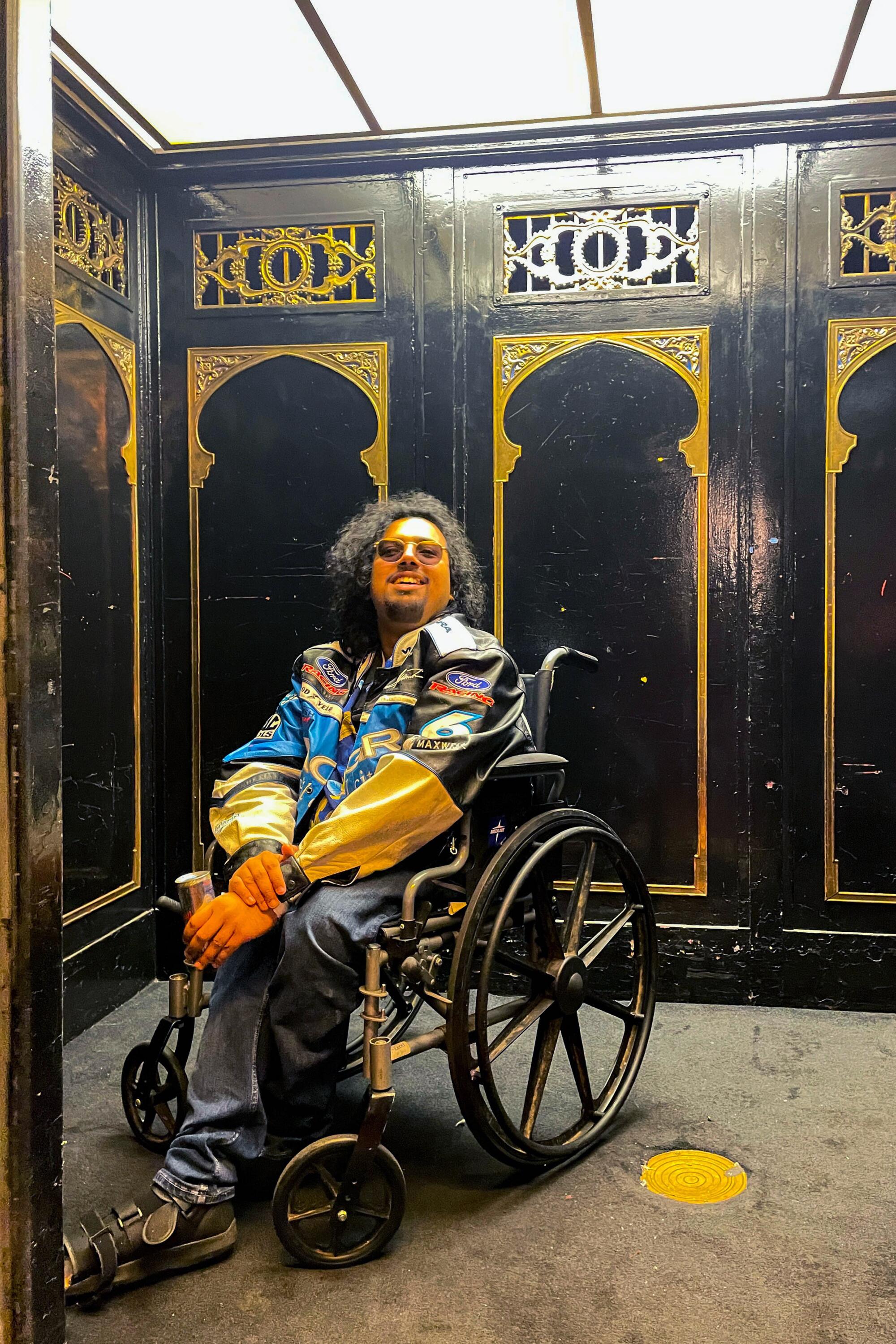
A two-event night is his bare minimum. Many weekends, he embarks on what he describes as “a bender” — heading to four events in one night all over the city. For this night’s festivities, Majumdar has opted for his manual wheelchair, a lightweight, foldable chair that gives him more flexibility in how he can move around the city and within venues. What the manual chair lacks in speed and convenience, it makes up for in possibilities. If he can’t manage to get an accessible Uber, he’ll either call an UberX or catch a ride with someone by hoisting himself out of his chair into the car’s backseat and having someone throw the chair in the trunk. The lighter chair also comes in handy for underground parties, which are less likely to be held in venues compliant with the Americans With Disabilities Act, a federal law that protects people with disabilities.
The wheelchair choice is just one of the many precautions he takes when orchestrating his weekends. He makes sure to introduce himself to every security guard he comes across, offering a firm handshake. Promoters, clubgoers and artists recognize him in his flashy vintage racing jacket emblazoned with the Viagra logo. Even so, he says, it doesn’t always make it easier or less lonely for him going out.
At Heav3n, the fabulous, spooky and weird party people find nirvana. Walk through the gates of this queer-friendly L.A. dance party and free your inner devil.
Raised in a small village in West Bengal, India, Majumdar moved to California to study engineering in 2015. On a full scholarship at Stanford, going to college was his first time leaving home. “I went from having no freedom to all the freedom, overnight. I made an absolute idiot of myself. I was known as BWK before people even knew me as Sap. BWK stood for Blackout Wheelchair Kid,” he said. He says his alcohol overconsumption got him in trouble with the university, which led to a drinking ban. When he violated that ban, he says, he was suspended for a year. He transferred to a local community college to retain his student visa status but, after losing his student housing, he became homeless for a period and lived in a Stanford library. Even more ostracized than he already felt at Stanford, he entered a deep depression.
He found solace and belonging at his first concert experiences seeing electronic artists like Odesza and Kygo. During his suspension, one of his friends, a wealthy Stanford student, offered him two Coachella wristbands with a few days’ notice. While he couldn’t coordinate getting there in time, Majumdar sold the tickets and used the money to buy a pass and accommodations for himself for the second weekend.
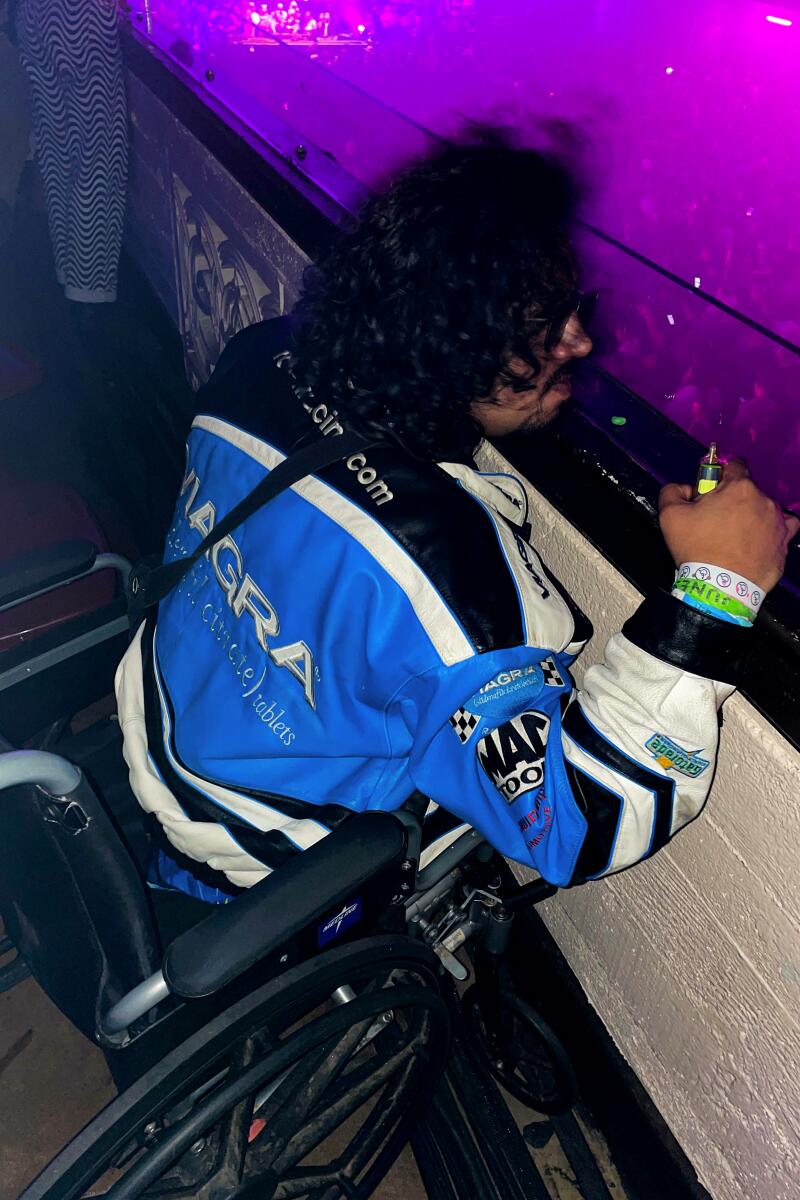
Sap looks down at the crowd raving below. (Nichelle Dailey / For The Times)
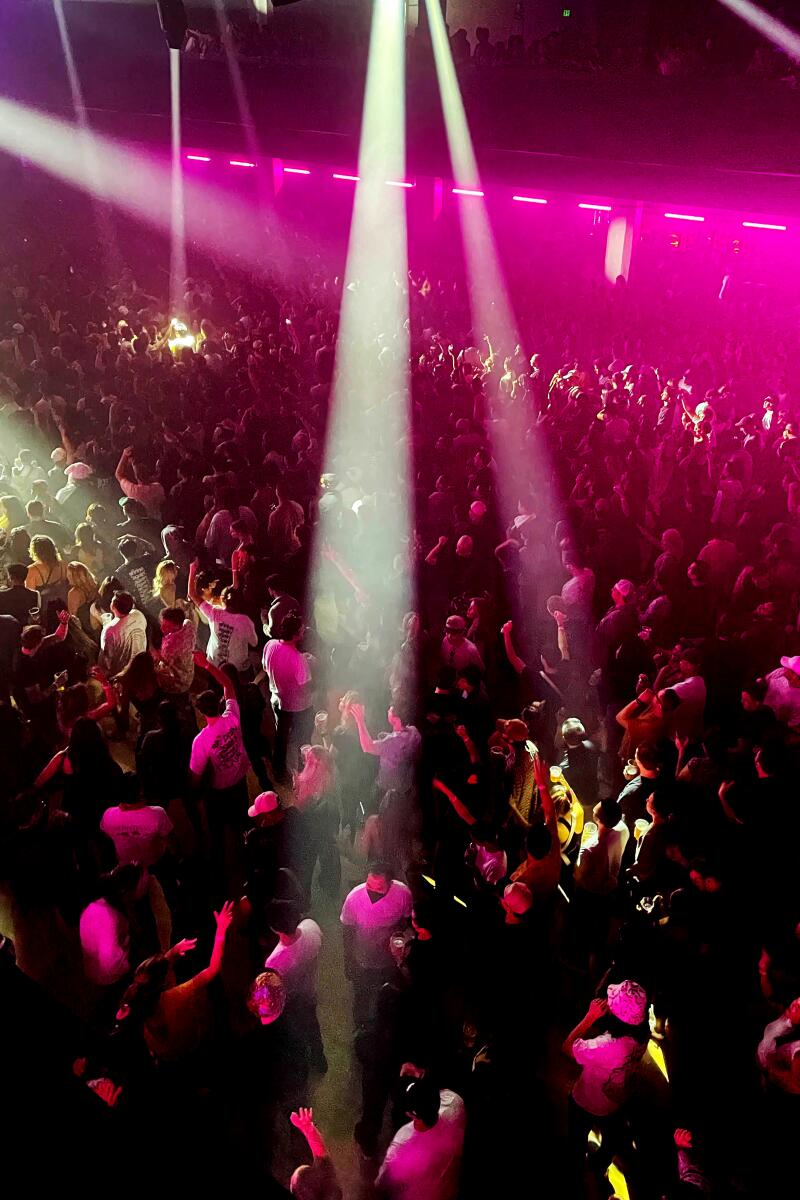
View of the crowd at the Shrine from the 2nd floor. (Nichelle Dailey / For The Times)
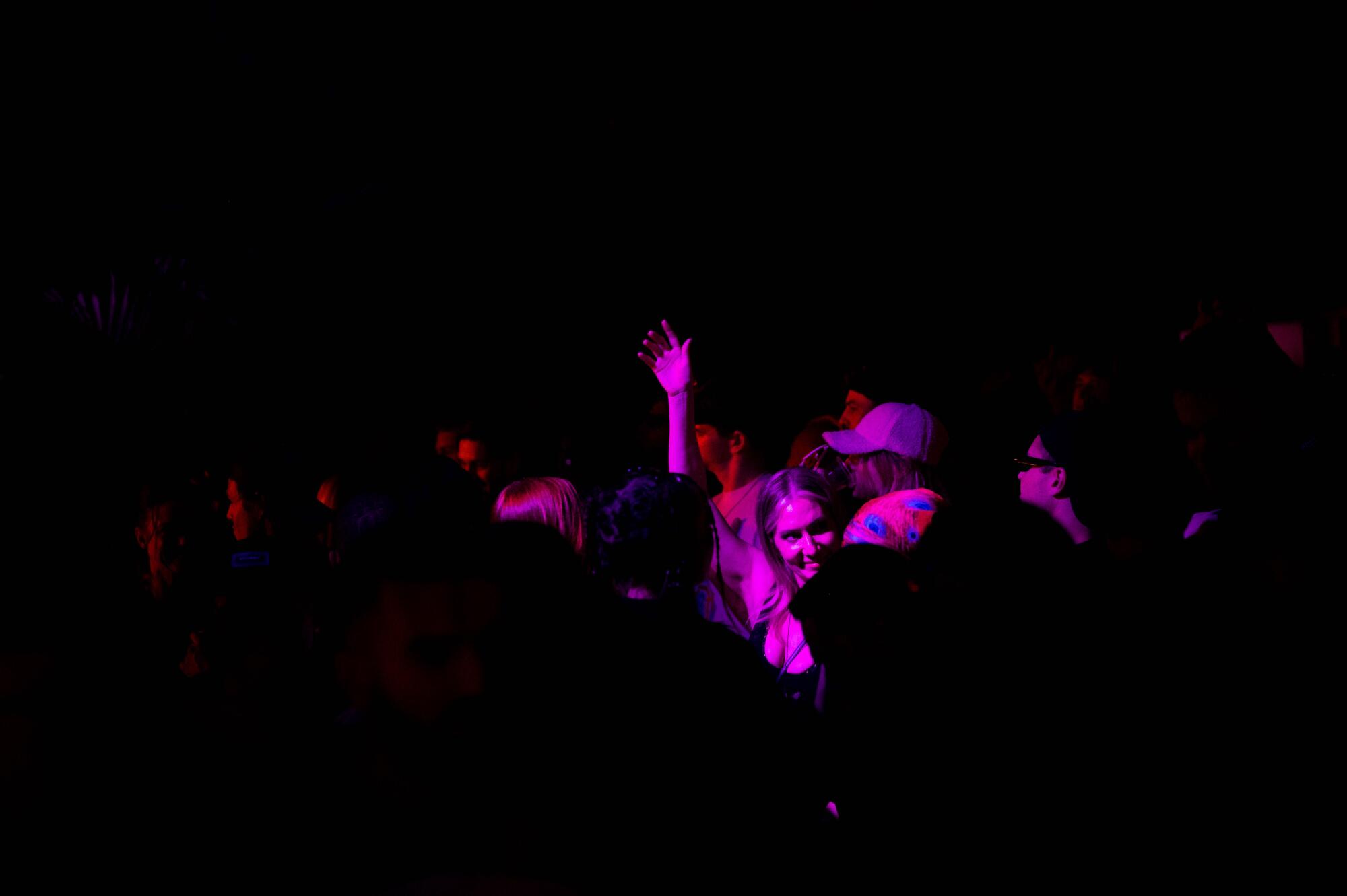
He was readmitted to Stanford after a quarter and graduated on time with his class in 2019. Soon after, he moved to Los Angeles to work at a now-defunct ticket resale startup, hoping it would serve as his “Trojan horse to a music industry job.” On the side, he began reselling tickets on his own.
Settling into the scene in Los Angeles wasn’t easy. Discovering parties outside of the bro-y Westside and Hollywood crowd took time. The widespread layout paired with infrequent accessible Ubers at the time made it difficult to get around. He often took the bus home from downtown at 3 a.m.
“Disabled people are one of the most marginalized groups on the planet. We face a physical, literal barrier to enter spaces,” he said. “We also face a major financial burden. In order to live a life that is acceptable to me, where I go out how I do, I spend about $5,000 per year on wheelchair-related costs.”
When pandemic-related shutdowns began, he lost his job and side income and delivered food for apps like Doordash and Uber Eats via electric wheelchair. While doing deliveries, he listened to as much music as possible and studied promising acts coming out of Europe and the U.K. He began posting his findings to his Instagram, @yourfavoritecripple. He says the slur in his username is his way of reclaiming the discomfort able-bodied people feel around disability, especially when they aren’t used to sharing space. His posts began to circulate among L.A. partiers and music industry professionals. Once COVID-related restrictions eased up, he was hired for a few months as a freelance talent buyer for Minimal Effort, a dance music promoter, and he cultivated as many industry relationships as possible.
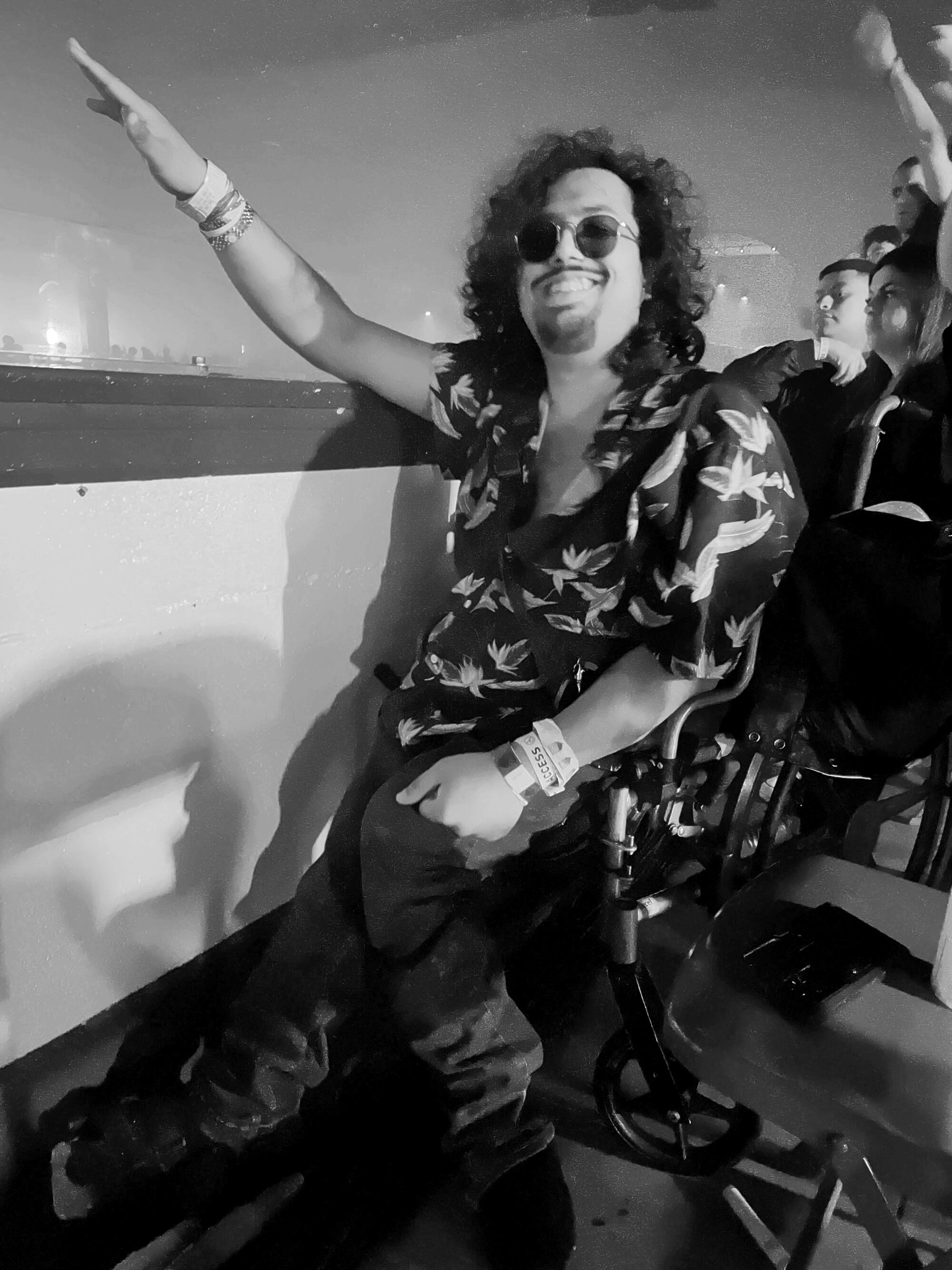
Now, he gets into many events for free, or is upgraded to VIP by a manager or agent. Even so, he experiences barriers the people guest-listing him aren’t privy to. At the Shrine, with its 5,000-capacity expo hall, Majumdar is the only attendee in sight in a wheelchair. “I usually find that I’m the only person in a wheelchair at an event, but hey, somebody’s gonna do it first,” he said.
Tonight, he wants to go to the balcony, where there is a reserved accessible section. To get there, he needs to take an elevator. But the elevator requires an escort, whom none of the security guards can find. It takes nearly 20 minutes as Majumdar waits backstage, behind a curtain, missing half of his favorite artist’s set. In the meantime, there’s an underground VIP bar his wristband grants him access to, but it requires stairs to enter. He isn’t bothered because he’s experimenting with alcohol-free partying. Eventually, he’s escorted to the elevator and up to the accessible section, a roped-off area against the railing with a clear view of the stage but none of the sweaty camaraderie of the dance floor. The area is crowded with attendees who have mistaken it for a VIP section or just want a good view. When Majumdar approaches, a security guard ushers them away. Everyone in the section needs a special wristband and Majumdar was given two for the night. Sometimes, he receives fewer and has to separate from friends.
Barney’s Beanery, which opened in West Hollywood in the 1920s, has recently attracted a Gen Z crowd. For young patrons, the dive bar offers them a new experience.
“I prefer to be in the crowd, but sometimes it isn’t possible. Growing up, I never saw anyone in a wheelchair with a robust friend group,” he said. “There’s a social aspect to having a disability where people will think you’re a burden. You need a group of friends who are willing to understand your needs aren’t the same as theirs. When you find those people you stick with them forever.”
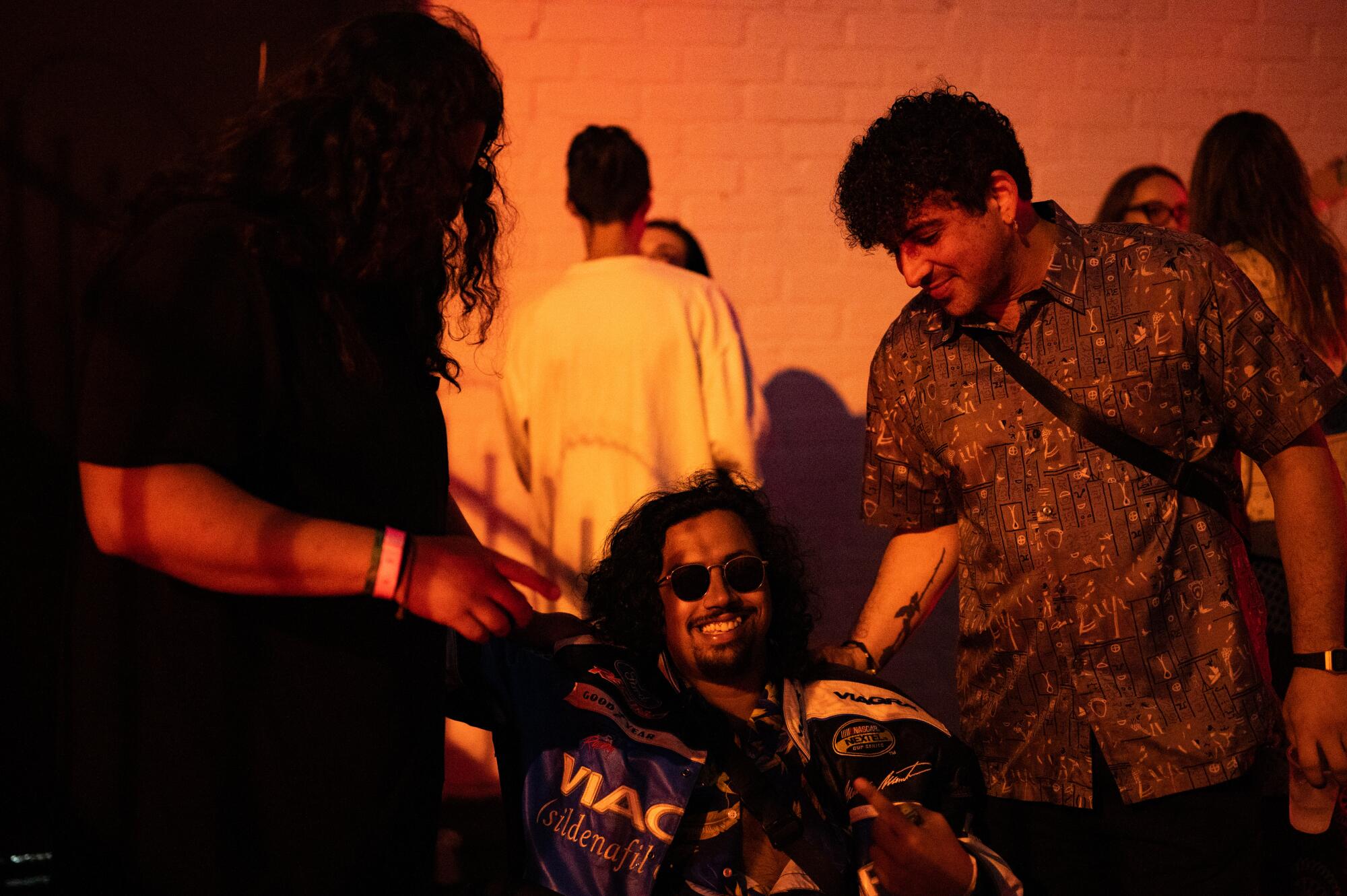
Miguel Risueño, co-founder and chief creative of Production Club, a Los Angeles-based event production studio, met Majumdar on a dance floor. Risueño began following Majumdar’s weekend recaps on social media, considering his notes for upcoming events. “Accommodating attendees with disabilities often becomes more of a formal checkbox on a list rather than a thoughtful step. What someone on the organizer’s side might see as an affordable worsened experience for a few, or a small drop in attendance, in reality it’s a sociocultural f—up that ruins your events and the industry for everyone long-term,” said Risueño.
A conversation with Majumdar about an upcoming event at the Los Angeles Coliseum led to major changes in design and production. “He had feedback on speaker placement, bars, stage orientation and DJ booth height in regards to sound and sightlines. The event had a no-video policy, but after the event, he showed me a few videos he snuck to highlight how I could have done better,” added Risueño.
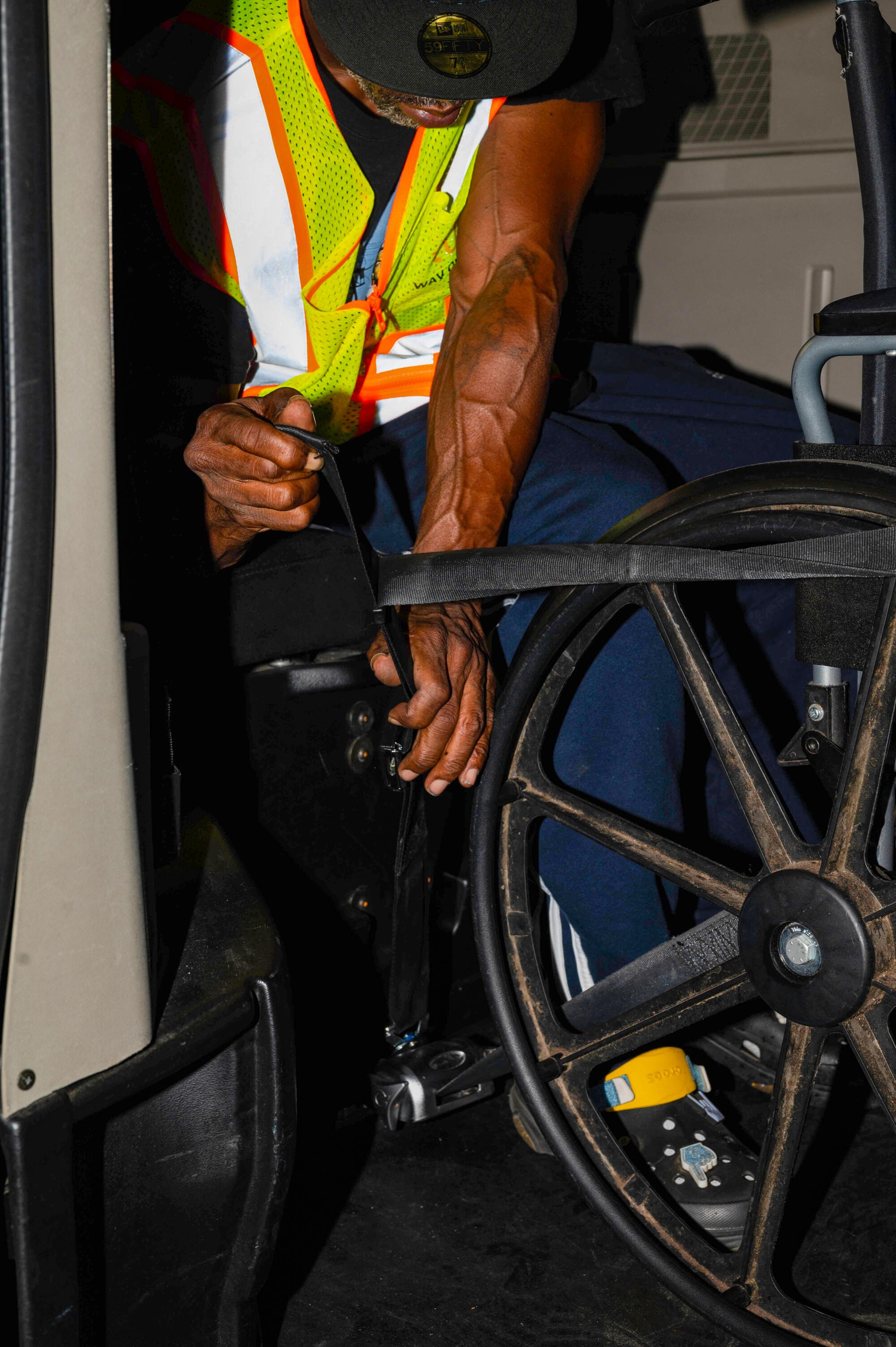
Despite the elevator delays and crowding of the accessible section, the night at the Shrine goes smoothly for Majumdar, who dances on the balcony as friends and followers approach him. He calls out his appreciation of the event in real time and later in an Instagram post, which Fred Again.. reshares to his millions of followers.
At other events, he’s had more difficulty. On Aug. 4, Majumdar went to see DJ Boys Noize at an event promoted by 30-year-veteran promoter Insomniac. He says he arrived at the legal, permitted event at 930 Mateo to find there was no ramp for him to bypass stairs at the entrance. There was an accessible elevator, but the staff couldn’t find the keys to use it. Majumdar then says he resorted to being carried down the stairs.
“If that was your first experience, you’re not going to go to more shows even though to fix it, if anything, we need more disabled people going out. Whenever I speak to other disabled people they tell me when they go out and face these literal barriers to entry, it makes it almost not worth it,” he said.
Los Angeles’ nightlife thrives on its dance halls, lounges, bars and community hubs. Kick off your weekend at one of the 57 hottest clubs in the L.A. area.
When he returned to the venue on Oct. 6 to see Disclosure, he had to be carried in again, Majumdar notes. He didn’t use the bathroom at the venue last time, but this time there were no accessible Porta Potties in the general admission area. He shared with The Times a detailed email he sent to Insomniac representatives about his experience. In response, he said, he received an apologetic call from Ten Fifty Entertainment, a third-party company Insomniac has used to manage accessibility at events. In an emailed statement, Insomniac said it maintains “the highest standards of accessible and inclusive entertainment experiences. This extends across our extensive portfolio of owned and operated nightlife venues, concerts, and festivals in Los Angeles and beyond. We regret any confusion regarding accessibility features and want to clarify that the specific venue in question is not an Insomniac owned property.” While the warehouse on Mateo Street is not owned by Insomniac, both events were promoted by the brand and are still listed on its website.
Still — the talent at Insomniac events keeps Majumdar coming back. When he attended Disco Trip on Nov. 11, an event in downtown L.A.’s Grand Park, the venue was accessible and had accessible bathrooms in the front and back of house. There was a lift for him to bring his chair to the side stage to view from the VIP vantage point, something he has found is often neglected under what he believes is an industry-wide assumption that people with disabilities don’t exist backstage.
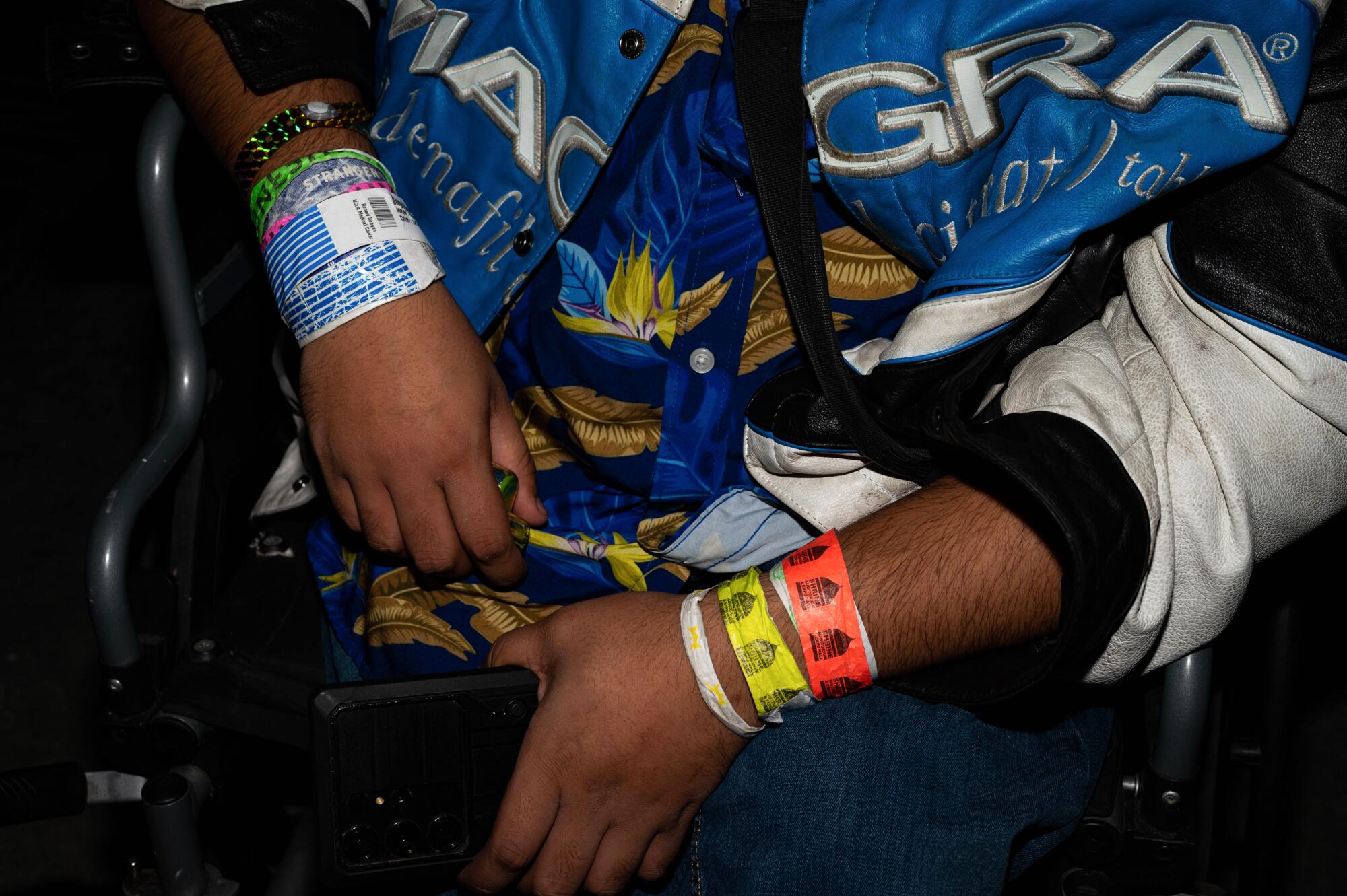
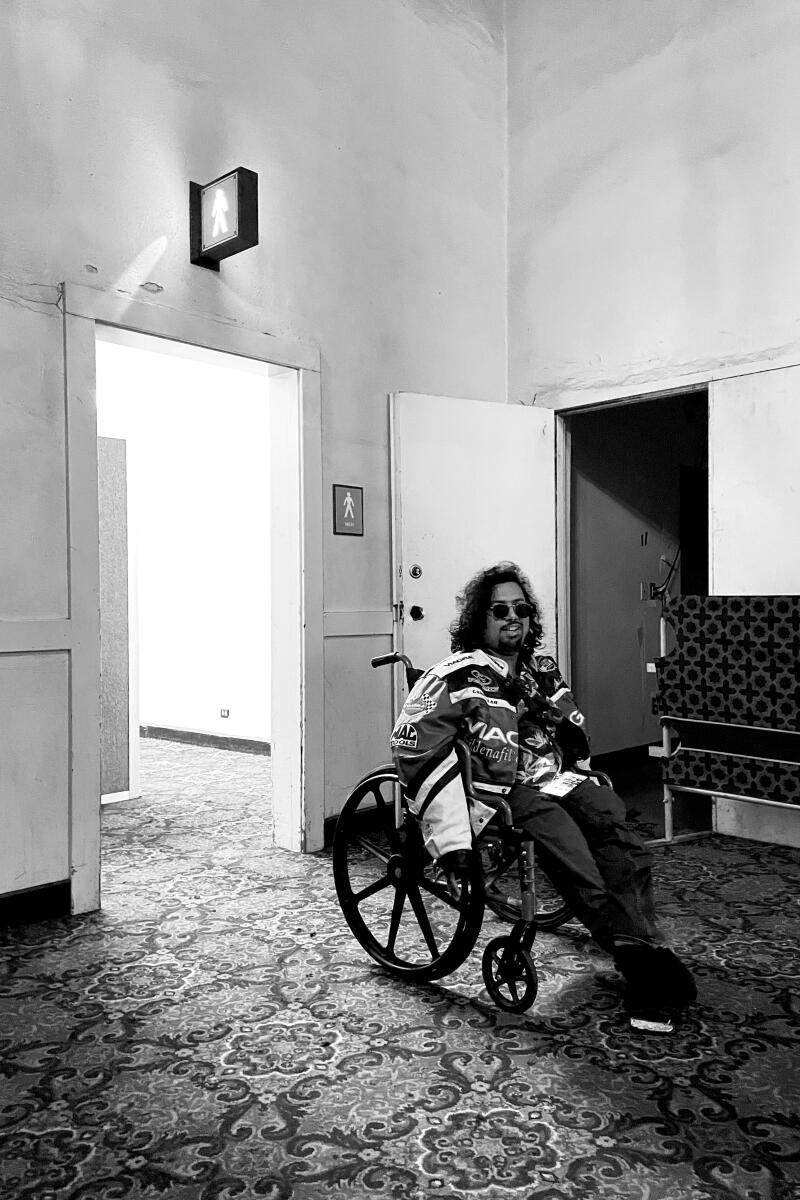
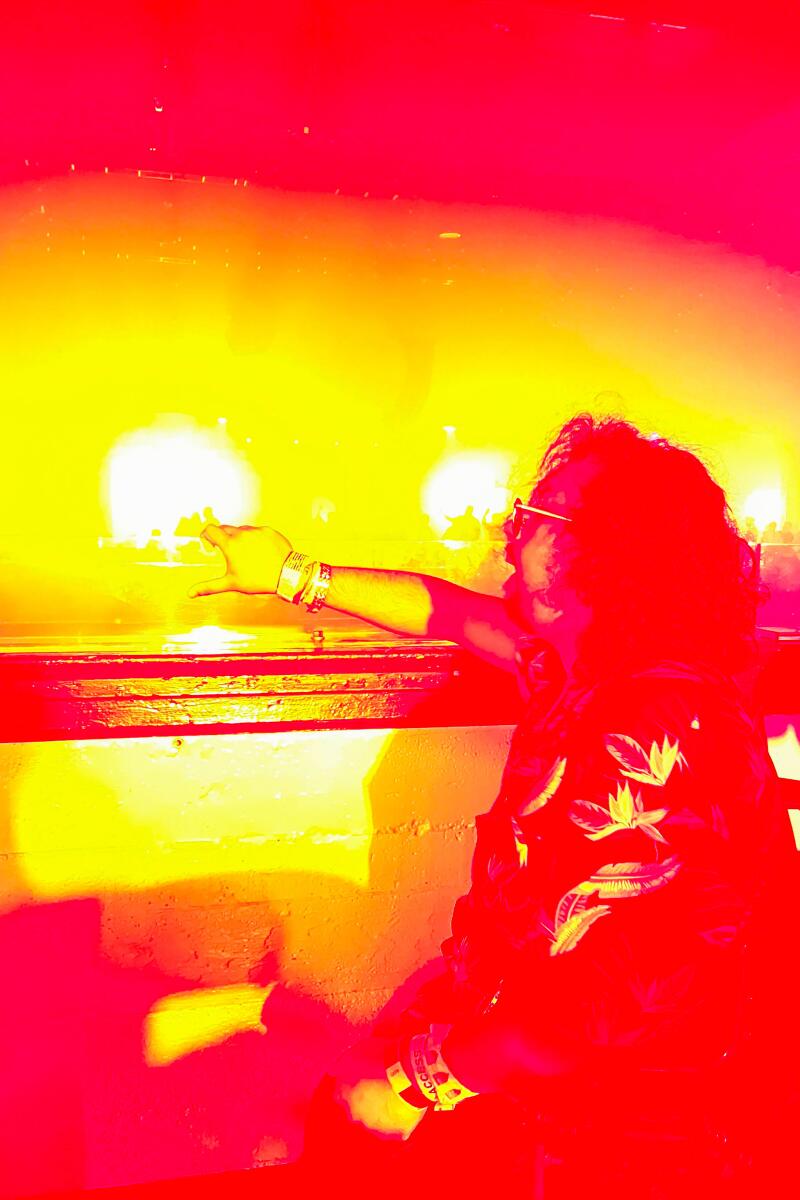
Sap at The Shrine after using the bathroom on our way to the vintage elevator to go to the 2nd floor. Sap enjoying the show from the 2nd floor at the Shrine. (Nichelle Dailey / For The Times)
After the Shrine closes, Majumdar and a few friends head to a warehouse party in a secret location downtown . The entry to the space is accessible, but only by coincidence. Events operating outside of the mainstream, such as underground raves, have less pressure to follow ADA requirements by the nature of operating outside of legal guidelines to begin with. In many cases, this tight-knit community is even more accommodating to Majumdar. But a few outliers have been less welcoming. During a recent trip to New York City, he emailed a promoter to inquire about accommodations at its underground event. The promoter suggested he sell his tickets and not attend, as the space was not accessible for people with wheelchairs. He decided to go anyway and found it easy to access, leaving him feeling discriminated against. Despite his frustration, when he posted on Instagram about the experience at the New York event , he didn’t disclose the promoters’ names due to his commitment to the underground scene.
Instead of substances, partygoers use tools such as meditation, breathwork and somatic movement to get in the flow and connect with one another.
When he isn’t staying out until 6 a.m., as he does after the Shrine, Majumdar makes money through ticket reselling and hopes to secure a stable job in the music industry that pays a living wage, ideally as an A&R rep scouting and developing talent. He’s in the early stages of starting a nonprofit to help others with wheelchair-related expenses and to encourage more music lovers with disabilities to attend live events through ticketing partnerships.
“I just wanna live my life in peace and be able to do the things that bring me joy in peace without encountering the thousands of issues I face when I go out,” he said. “There’s a market for people who want to hear what I have to say and it turns out there’s a lot of disabled people who follow me online and message me saying seeing what I do helps them get out more. To me, that means I have achieved one thing in life.”
More to Read
Sign up for The Wild
We’ll help you find the best places to hike, bike and run, as well as the perfect silent spots for meditation and yoga.
You may occasionally receive promotional content from the Los Angeles Times.
